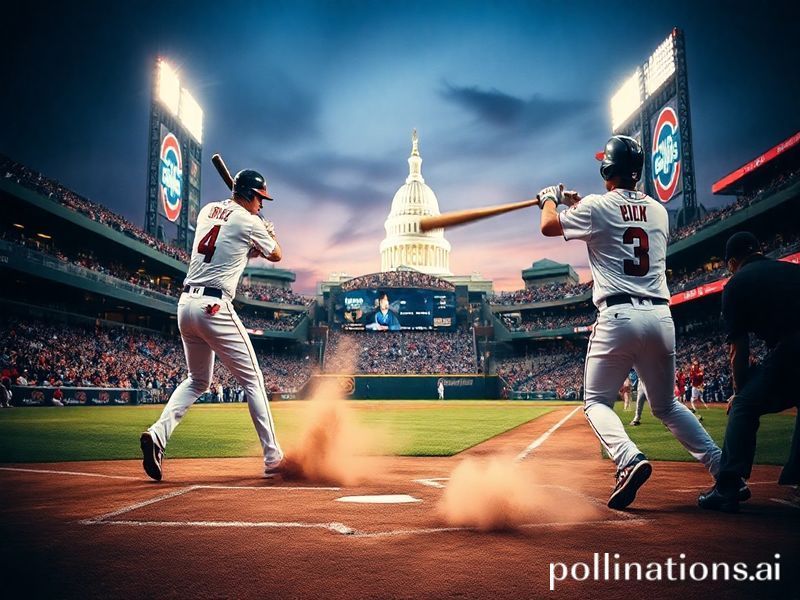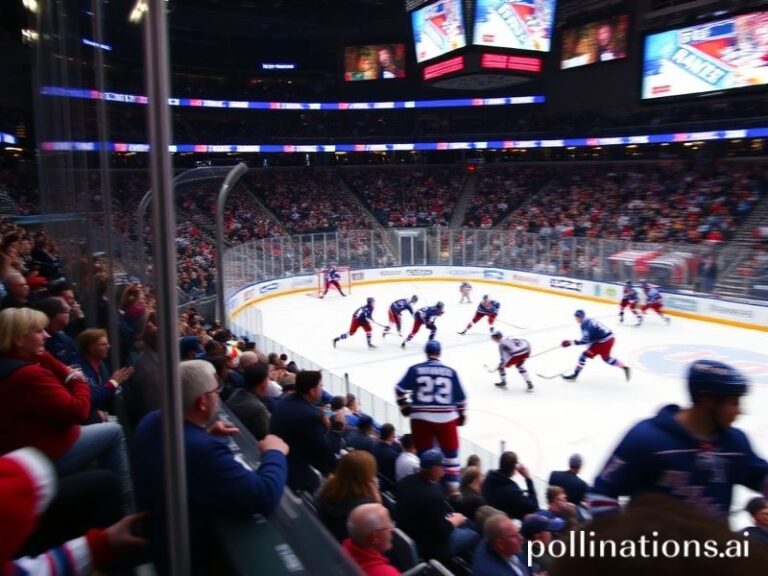Nationals vs Cubs: How a Meaningless Baseball Game Became the World’s Most Watched Metaphor for Decline
Nationals vs Cubs: A Proxy War of Futility Played Out on Imported Grass
By the time the Washington Nationals and the Chicago Cubs finish their three-game set this week, roughly 75,000 hot dogs will have vanished, 1.2 million beer cups will clog Midwestern landfills, and two sets of fans will convince themselves that “momentum” is a real thing. From Singapore to São Paulo, traders in everything from pork-belly futures to semiconductors will glance at the score on their Bloomberg terminals, nod sagely, and go right back to laundering geopolitical risk into basis points. Because in our gloriously globalized panopticon, even a glorified scrimmage between two teams hovering around .500 can be repurposed as a metaphor for the slow-motion unravelling of Pax Americana.
Let’s start with the Nationals, a franchise whose mascot is literally a bald eagle in aggressive sunglasses—an animal that spends most of its waking hours on federal no-fly lists. The Nats are owned by the Lerner family, real-estate barons who have leveraged Washington’s chronic housing shortage into enough passive income to subsidize a pitching staff that implodes on cue every September. Their stadium sits a foul ball away from the U.S. Capitol, a proximity that allows lobbyists to enjoy $15 craft IPAs while discussing which senator to waterboard with dark-money contributions. Internationally, the Nationals are what happens when you let a superpower’s administrative capital cosplay as a sports town: all pomp, no circumstance, and a bullpen ERA that resembles the Greek debt-to-GDP ratio.
Across the field are the Cubs, that lovable vortex of masochism whose century-long championship drought ended in 2016, thereby depriving the planet of its most reliable punchline. The Cubs are now owned by the Ricketts family, whose fortune is entwined with TD Ameritrade and whose politics oscillate between “libertarian yacht club” and “End Times prepper.” Wrigley Field—an ivy-clad monument to 1914 building codes—has become a pilgrimage site for European tourists who think baseball is quaint, like jazz or functional democracy. The Cubs export nostalgia the way Boeing exports safety incidents: prolifically, and with collateral damage measured in existential dread.
The matchup itself is geopolitical small-batch theater. The Nationals’ roster features a Dominican shortstop, a Venezuelan catcher, and a Japanese closer whose splitter breaks harder than German energy policy. The Cubs counter with a Puerto Rican center fielder, a Korean reliever, and at least two Canadians who apologize after every strikeout. In effect, the game is a miniature WTO summit played inside a brick amphitheater named after a chewing-gum magnate. Every pitch is a remittance of athletic labor from the Global South to North American spectacle; every souvenir cap stitched in Bangladesh is a tiny trade imbalance you can wear.
Meanwhile, the betting markets—now legal in enough U.S. states to qualify as a domestic IMF—price this contest like a Turkish lira swap. London bookmakers list the over/under at 8.5 runs, a number suspiciously close to the average annual inflation rate in Argentina. Crypto degens have minted NFTs of each anticipated strikeout, because if you’re going to commodify disappointment, you may as well use proof-of-stake. And on Weibo, Chinese fans live-stream the game with running commentary comparing Anthony Rizzo’s plate discipline to Xi Jinping’s anti-corruption campaign: long, grinding, and ultimately selective.
The real stakes, of course, are nil. Neither club will reach the playoffs without a miracle on par with a balanced U.S. federal budget. Yet the spectacle persists because hope is the last fungible asset in the American portfolio. Europeans have soccer hooliganism; we have $200 outfield seats and gluten-free nacho helmets. Latin American viewers see the game as another pipeline to MLB free agency; Japanese audiences treat it as a nightly drama where strikeouts substitute for ritual suicide. And in the broadcast booth, ex-players speak of “grit” and “heart” with the same sincerity defense contractors reserve for “democracy.”
When the final out is recorded, half the crowd will shuffle onto the Metro, furious that they paid surge pricing for a train that still smells like 1976. The other half will Uber to Navy Pier, convinced that tomorrow’s double-header is destiny. Somewhere in Brussels, a bureaucrat will note that the Cubs’ win probability is inversely correlated with the euro. And somewhere in Caracas, a kid will mimic Juan Soto’s leg kick in an alleyway, dreaming of a future where the only export is swing mechanics.
Baseball, they say, is a metaphor for life. That’s only true if your life features bloated contracts, chronic underperformance, and a fan base that mistakes Stockholm Syndrome for loyalty. At least the hot dogs are kosher—for now.







